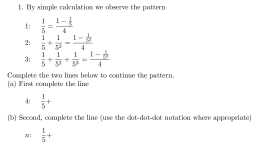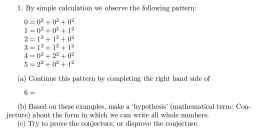Department of Mathematics, Statistics
and Computer Science
Wim Ruitenburg's Fall 2012 MATH 1300-101
Last updated: September 2012
Comments and suggestions: Email wimr@mscs.mu.edu
Why Mathematics? Living with Uncertainty
A large part of our conscious lives revolves around believing things.
We may have to.
- Some things we believe because we like to believe them.
This is comforting, but we run a fair chance of being mistaken.
- Some things we believe because we have it on good authority, to the best
of our understanding.
Our ancestors usually believed that the earth was flat.
Now most people believe that the earth is round.
- Some things we believe by the authority of experiment.
When we release a pen or a book or a pebble, it falls to the ground.
Try again and the object falls again.
And again.
And again.
Many people believe that all objects, when released, fall to the ground.
This essentially is a belief based on scientific experiment.
Are there things that we can know with certainty?
Maybe not, but are there things that we can establish as true with
maximum assurance and, if so, how?
This is where mathematics comes into play.
Example Problem(s)
- Give your own examples of a belief for each of the 3 categories listed
above.
Motivate your answers.
- Suppose the teacher tells you that the earth is flat. On the exam you
are asked the yes-no question on whether or not the earth is flat.
- What is your answer to the yes-no question on the exam, and why?
- Give a justification for another student to make the oppositive choice
in answering the yes-no question.
Why proofs? Mathematics without proof
- Mathematical science is commonly seen as providing the highest level of
certainty.
However, mathematical science without proof is science, not mathematics.
- To illustrate the weakness of mathematics without proof, we introduce a
statement for which we use common sense scientific reasoning by which we may
come to believe it true.
Recall that a whole number bigger than 1 is called prime if we can not write it
as a product of smaller whole numbers.
So 2, 3, 5, 7, 11, 13, 17, 19, 23, 29, 31, and so on, are primes.
But 4 is not prime because 4 = 2*2; and 6 is not because 6 = 2*3; and 8 is not
because 8 = 2*2*2; and 9 is not because 9 = 3*3; and so on.
- Consider the function
For all whole numbers n the function f returns another whole number.
For example
- g(0) = 3
- g(1) = 5
- g(2) = 7
These five numbers are all prime.
Is it possible that g(n) is prime, for all values of n?
It would be careless to believe so based on just a few values.
It is common sense to try a few more cases:
Aha.
This one case suffices to show that g(n) is not always prime, because g(3) = 9
= 3 * 3.
- Consider the function
For all whole numbers n the function f returns another whole number.
For example
- f(0) = 0+0+41 = 41
- f(1) = 1+1+41 = 43
- f(2) = 4+2+41 = 47
- f(3) = 9+3+41 = 53
- f(4) = 16+4+41 = 61
Remarkably, these five numbers are all prime (you can check by trying all
possible ways to write them as products).
Is it possible that f(n) is prime, for all values of n?
It would be careless to believe so based on just a few values.
It is common sense to try a few more cases:
- f(5) = 25+5+41 = 71
- f(6) = 36+6+41 = 83
- f(7) = 49+7+41 = 97
- f(8) = 64+8+41 = 113
- f(9) = 81+9+41 = 131
These five are also prime!
Now many of us will consider it likely that f(n) is prime, for all n.
This is a sensible guess.
Just to be on the safe side, we check a few more cases.
We leave it to the reader to perform the tedious check that f(10), f(11),
f(12), f(13), f(14), f(15), f(16), f(17), f(18), and f(19) are indeed prime.
This is enough evidence for sensible people to believe that f(n) is prime for
all n.
- Sensible belief: f(n) is prime, for all n.
Even if we believe something like this, it is still of value to continue
checking.
In fact, a further tedious check shows that f(20), f(21), f(22), f(23), f(24),
f(25), f(26), f(27), f(28), f(29), f(30), f(31), f(32), f(33), f(34), f(35),
f(36), f(37), f(38), and f(39) are all prime.
It is common sense for many of us to claim:
- Strong belief: f(n) is prime, for all n.
But f(40) = 40^2 + 40 + 41 = 40 * (40 + 1) + 41 = 40 * 41 + 1 * 41 = 41^2 is
not prime.
As some mathematically thinking students observed:
f(41) is not prime for the obvious reason that it is divisible by 41.
Remarkably, f(n) is usually not prime.
- Conclusion:
Extensive experimentation, however persuasive, is not the same as
knowing something with maximum certainty.
Example Problem(s)
- Give your own precise definition of what is a prime number.
You may use as context that we only talk about natural numbers 0, 1, 2,
3, 4, 5, ...
- Click on the picture
 to read this problem.
to read this problem.
- Click on the picture
 to read this problem.
to read this problem.
Mathematics with proof
- Let us try another case.
We easily check the following sums:
- 1 = 1 = 1^2, that is, equals 1 squared
- 1 + 3 = 4 = 2^2, that is, equals 2 squared
- 1 + 3 + 5 = 9 = 3^2, that is, equals 3 squared
- 1 + 3 + 5 + 7 = 16 = 4^2
- 1 + 3 + 5 + 7 + 9 = 25 = 5^2
- 1 + 3 + 5 + 7 + 9 + 11 = 36 = 6^2
Now it is sensible to believe that the sum of the first n odd numbers equals
n^2, that is, equals n squared.
But we may be wrong.
In such cases a mathematician may make a conjecture.
- Conjecture: For all n, the sum of the first n odd numbers equals n^2.
When using formulas, one can also write
- Conjecture: For all n, the sum 1 + 3 + 5 + ... + (2n-5) + (2n-3) +
(2n-1) equals n^2.
The notation + ... + means that if n is big enough, then we are
supposed to also include the numbers in between, like 7 + 9 + 11 + 13 +
and so on.
There happen to be multiple ways to prove the conjecture.
- Proof 1 Proof by induction.
The idea is that if (1) you know how to step on the bottom rung of a ladder,
and (2) you know how to step from one rung to the next one up, then you can
climb to any level on the ladder that you may wish.
- The conjecture holds when n equals 1. We tested that case above.
- Suppose that the conjecture has been proved for a certain value, say
p.
So we suppose that 1 + 3 + 5 + ... + (2p-3) + (2p-1) equals p^2.
Then 1 + 3 + 5 + ... + (2p-3) + (2p-1) + (2p+1) equals p^2 + 2p + 1, which
simplifies to (p+1)(p+1) or, in other notation, (p+1)^2.
Thus the conjecture also holds for p+1.
We call this the induction step.
- So, by mathematical induction, the conjecture holds for all
n, that is, the conjecture is proven true.
We don't have to give another proof of the conjecture.
We are done.
Still, we give some more proofs just to show that there may be several ways to
prove one conjecture.
So here is another proof.
- Proof 2 Proof by algebraic manipulation.
Write S(n) as short for 1 + 3 + 5 + ... + (2n-3) + (2n-1).
So also:
- S(n) = 1 + 3 + 5 + ... + (2n-3) + (2n-1)
- S(n) = (2n-1) + (2n-3) + ... + 5 + 3 + 1
Note that 1 + (2n-1) equal 2n.
And 3 + (2n-3) equals 2n.
And 5 + (2n-5) equals 2n.
And so on until the last pairs:
(2n-3) + 3 = 2n and (2n-1) + 1 = 2n.
So when we add the two lines above, we get
- S(n) + S(n) = 2n + 2n + 2n + ... + 2n + 2n, where there are n
occurrences of 2n on the right hand side.
So 2S(n) = 2(n^2). Thus S(n) = n^2.
- Proof 3 Finally, here is a picture proof of the same
conjecture.
We can build squares in layers, like an onion.
In the picture, start with a smallest square formed by the single box
This gives a 1 by 1 small square.
To extend this to a 2 by 2 square, we must add a layer of 3 boxes
Next, the 3 by 3 square.
The added layer consists of 5 boxes
And so on.
So, in the picture below, the 5 by 5 square has 5^2 = 25 fields, built as a sum
of layers with 1, 3, 5, 7, and 9 fields:
Example Problem(s)
- Use the method of Proof 2 above to find a closed
formula for the sum of the first n positive numbers.
Mathematics is hard
- Here is an example of something that was proved, but that is very
difficult.
Simple experimenting shows that we can write all small numbers as sums of
four squares, sometimes in more than one way.
For example,
- 0 = 0+0+0+0
- 1 = 1+0+0+0
- 2 = 1+1+0+0
- 3 = 1+1+1+0
- 4 = 1+1+1+1 = 4+0+0+0
- 5 = 4+1+0+0
- 6 = 4+1+1+0
- 7 = 4+1+1+1
- 8 = 4+4+0+0
- 9 = 9+0+0+0 = 4+4+1+0
- blablabla
- 107 = 81+25+1+0 = 81+16+9+1 = 64+25+9+9
- blablabla
By checking many cases we may believe, but will not know,
that all numbers are sums of four squares.
In the eighteenth century the Italian-French Lagrange proved that all
numbers are sums of four squares.
Shortly thereafter, the Swiss Euler gave a nice proof which is the better known
one.
The proof is by mathematical induction.
The proofs essentially show for all positive numbers n that if one already
knows that all numbers less than n are sums of four squares, then n itself is
also a sum of four squares.
We already saw that 0, 1, 2, 3, 4, 5, 6, 7, 8, and 9 are sums of four squares.
So by their proof, 10 is also a sum of four squares.
Now we know that 0, 1, 2, 3, 4, 5, 6, 7, 8, 9, and 10 are sums of four squares.
So, again applying their proof, 11 is also a sum of four squares.
Now we know that 0, 1, 2, 3, 4, 5, 6, 7, 8, 9, 10, and 11 are sums of four
squares.
So, again applying their proof, 12 is also a sum of four squares.
And so on.
Thus, by mathematical induction, all numbers are sums of four squares.
There is another proof using something called quaternions.
Example Problem(s)
- Write 100 as a sum of four squares in three ways (there actually are
more than three ways, but finding three is hard enough).
 to read this problem.
to read this problem.
 to read this problem.
to read this problem.
 to read this problem.
to read this problem.
 to read this problem.
to read this problem.